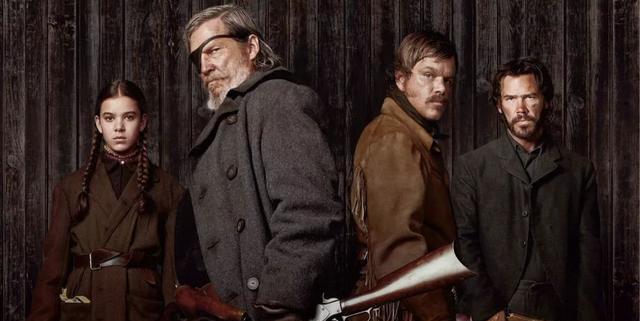I've always thought of Earth Thunder as the Coen brothers' best work, not one of them. Because it has both the warmth reserved for sheriff Maggie in "Ice Storm" and the powerlessness of sin in "Old Nothing".
The film tells the story of Marty Rose, a 14-year-old girl in the Western United States in the 1870s, accompanied by Marshal Coburn and Texas Mounted Police Officer Le Boyff, to the wild Indian territory to track down her father's killer.

Tears are not believed in the Indian territories of the west, which is still a forgotten corner of law and civilization, and it believes only in the natural laws of survival of the strong.
Compared to Coburn, a bailiff nicknamed "Big Rooster," Rose is clearly not a tough guy type, and her only experience camping in the wild was to follow her dad to the park to hunt raccoons. She could not control her own little black horse, and her light body even gave the little black horse the illusion that she only had lice on her back.
But after all, man does not win by brute force, the real strong is a combination of wisdom, faith, courage, strength, tenacity and other characteristics, Rose's thin body hides the great soul, as she said in a letter to her mother:
Dearest mother, I am about to embark on a great adventure, I heard that Tom Cheney escaped into the wilderness, and I will assist the authorities in arresting him, you know Dad always makes me believe in justice, just as he has always done, so don't worry about me, even if you walk through the valley of death, I am not afraid of harm, the Creator of all things looks down on me... My father's death will eventually usher in revenge.
The scene of Kaubern and the mounted policeman LeBoyef riding across the river should be the coming-of-age ceremony of fourteen-year-old Little Rose, since then, in the absence of civilization, no law, only the natural law of survival and weakness on the other side of the river, Little Rose has experienced repeated dangers, she used wisdom to mediate the contradiction between the two tough guy companions, she won the respect of her companions with wisdom and courage, and Le Boyyff finally corrected his previous prejudice and arrogance against Rose with an apology of "I misread you".
Most importantly, at the cost of losing an arm, she ended the life of the murderer Tom Cheney with the gun of her companions, fulfilling her long-cherished wish to avenge her father.
Everything in this world has a price, and what is owed will eventually be repaid, and nothing is free except for god's grace.
Ross's highly prophetic voiceover seems to indicate the ambitious values that the Coen brothers permeate the film: everyone has to pay for their choices, and fate will give everyone the right reward.
Coburn, a bailiff, is grumpy, drunk, fierce, decisive, and often crosses the line. Incompatible with the civilized world, the Indian territory on the other side of the river is like a fish, and once defeated seven bandits with one person, and was very brave. He was born strong, but he was destined to be banished by civilization. Both wives left him one after another. The only son did not like him either, and he became the drunkard of civilized society and the dart of the wild Westworld.
LeBoyef, the Texas Mounted Police, hunted down Tom Cheney day and night, ostensibly for honor and duty, but in fact for a lucrative honorarium. He broke a rib by Coburne's accidental shooting, was dragged by bandits on horseback and nearly broke his tongue, and nearly died in a fight with Tom Cheney.
One of the three dead bandits in front of the Boburn Hotel in the snowstorm feared that he would die without a place to die and would be eaten by wolves, but the result was a slur. And the nameless corpse hanging high on a branch, allowed to come and peck at it.
All these scenes, beneath the bloody violence lurk desolate, tragic and futile. What kind of fate to choose, what kind of consequences to bear. There is no room for you to regret it, and it will not give you a second choice.
There is a plot that many viewers may find impossible to explain, why did Cowburne rudely kick a little Indian girl down twice in front of bagby's grocery store, and the little girl was indifferent and resigned? A reasonable explanation is that in this world where the strong are king, the weak can only be looked down upon, condescending, and accept that looking up is the patent and glory of the strong, which is the tradition of the Westworld.
Another interesting picture is that when the bandit Ned Bieber is found in the cave, the picture of Cowburn from inside the cave is not particularly like the tough guy Ethan (John Wayne) isolated outside the door of the civilized world in "Searcher", which is probably a tribute to John Wayne, after all, John Wayne's 1965 version of "Earth Thunder" is also a rare classic in Westerns.
Sadly, time always slips away from us, and the expedition to the Western Indian Territory is destined to be legendary, and twenty-five years later, the retired Cowburne remembers those glorious old days in theatrical performances until his death. The one-armed Rose has also become the curtain of the times, guarding the loneliness and glory in his heart, and gradually aging.
The advent of the Age of Civilization put an end to the barbarism, violence, and bloodshed, while that cold, flamboyant Westworld vanished, and sometimes it is not clear whether to rejoice or grieve for it.